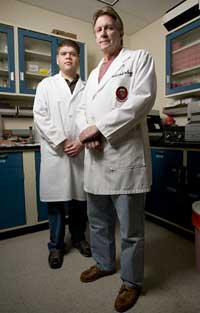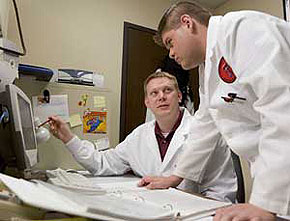Research/Academic Showcase
Texas Tech University
Howard Hughes Medical Institute Gives $1.5 Million to Texas Tech's Science Education Program
Texas Tech University Health Sciences Center
U.S. Congressman Visits Health Sciences Center's Department of Speech, Language and Hearing Sciences
Alumni Highlights
Llano Wines and Texas Tech: a Tasty Combination
Catching Up With Your Fellow Red Raiders
Development
Endowed Chair Created in Wildlife Management
Athletics
Floren Named to PING All-America First Team
Pair of Red Raiders Named to Preseason Lists
Texas Tech University Press
New Book Lists Collections of Vintage Clothing
Helpful Links
Howard Hughes Medical Institute Gives $1.5 Million to Texas Tech’s Science Education Program
The Howard Hughes Medical Institute Science Education Program received a four-year $1.5 million grant in June. The money will help organizers continue an undergraduate research program for students like Octavio Aguilera.
Research/Academic Showcase
 Under the supervision of microbiologist Dr. David Straus, right, 22-year-old microbiology major Octavio Aguilera is doing research through TTU’s Howard Hughes Medical Institute Science Education Program.
Under the supervision of microbiologist Dr. David Straus, right, 22-year-old microbiology major Octavio Aguilera is doing research through TTU’s Howard Hughes Medical Institute Science Education Program. Before pursuing a graduate or medical degree, 22-year-old Octavio Aguilera decided he’d better do some research in a laboratory while still an undergraduate student.
The microbiology major from El Paso is one of about 40 students enrolled in Texas Tech University’s Howard Hughes Medical Institute Science Education Program, which received a four-year $1.5 million grant in June from HHMI.
Texas Tech was one of four Texas universities and 50 universities nationwide to receive a Howard Hughes Medical Institute grant to support undergraduate research. This is the fifth consecutive grant for TTU since the program began in 1992.
Under the supervision of microbiologist Dr. David Straus, Aguilera conducts research on toxic molds. Aguilera says the program offers him an edge in getting into graduate or medical schools.
“Sometimes, I’m the first one to discover something no one’s done before,” he says. “I’m doing research in microbiology and immunology. We’re exposing goats to toxic molds and seeing how their immune systems react.”
The research is important, Straus says, to find out what physiological changes happen to animals that inhale toxic molds. Not only do these molds occur in buildings, but also in the dust of feed lots. By exposing animals to the molds, scientists can make assumptions about what happens to humans exposed to them, which can help doctors treat mold-related illnesses such as respiratory and neurological disorders. Also, feedlot owners can take steps to reduce mold-laden dust to keep animals and workers healthy.
The science education program allows students such as Aguilera the chance to work in the laboratory with faculty research scientists, says Dr. Michael San Francisco, director of the program. It provides students with new opportunities in research and hands-on science educational activities. It also motivates and guides area school teachers with new skills to bring science into their classrooms.
 Aguilera, left, is helping graduate student Robert Layton on the immune response of goats to toxic molds.
Aguilera, left, is helping graduate student Robert Layton on the immune response of goats to toxic molds. “The grant will help us to continue our current undergraduate research and science education activities with faculty,” San Francisco says. “It will help us to continue our pre-college and outreach programs. Also, we work with teacher leaders in this area. We train them and have traveling labs for them to enhance their skills and their abilities to bring science into the classroom.”
San Francisco says the program will expand during the next four years to begin a teacher training program to enhance the classroom skills of post-doctoral and doctoral students who wish to become future faculty members.
“This grant validates our activities,” he says. “It shows the university’s not only functioning within itself. It’s going out and educating students and teachers. We bring science to the community at large.”